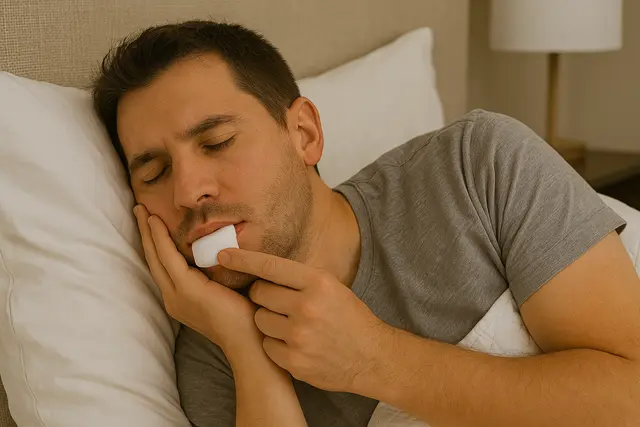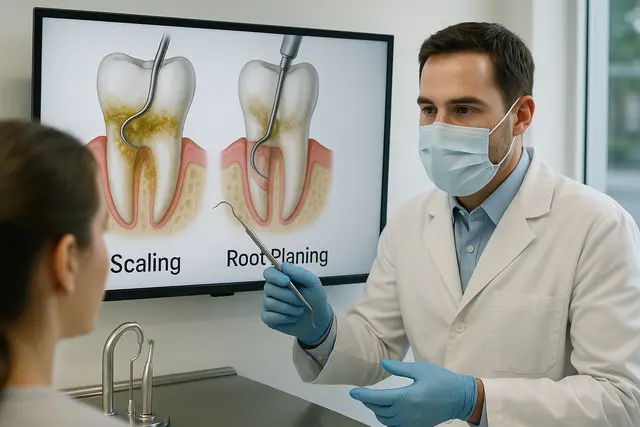General Dentistry
5 min read
May 12, 2025
Can I Sleep With Gauze in My Mouth After Tooth Extraction?
After a tooth extraction, especially wisdom tooth removal, all you want is rest. But before you drift off, it’s important to know whether it’s safe to sleep with gauze in your mouth.

After getting your wisdom teeth removed or any kind of tooth extraction, all you want is a nap. Your mouth is sore, your cheeks are puffy, and the anesthesia is still wearing off like a weird dream you’re not quite out of. But before you crawl into bed and call it a night, there’s one burning question: Can I sleep with gauze in my mouth after a tooth extraction? Short answer? No. And here’s everything you need to know, without the stiff talk, just real guidance that helps you sleep comfortably, safely, and without a dry socket surprise.
Tooth Extraction Isn’t Just a One-and-Done
Getting a tooth pulled isn’t like flipping a switch. Whether it’s a routine removal or a wisdom tooth extraction, the healing process starts the moment that tooth is out. Your body rushes to form a blood clot at the extraction site to protect your jaw and gum while it recovers. If you dislodge that clot early, say, by accidentally sleeping with gauze in your mouth, you could end up with dry socket, one of the most painful and annoying post-surgery issues around.
Wisdom Tooth Removal Comes with Extra Baggage
Let’s face it, wisdom teeth removal is practically a rite of passage. But it also tends to be more invasive than pulling a single front tooth. The surgical site might involve stitches, deeper wounds, and more swelling. That’s why smart aftercare matters even more, especially the first 24 hours. And when it comes to sleep after wisdom tooth removal, the name of the game is preparation.
Gauze: Your Temporary Friend
Your dentist probably had you bite down on gauze right after surgery to help stop the bleeding. Totally normal. But that gauze isn’t meant to stay there all night. Keeping gauze in your mouth while sleeping creates a serious choking hazard, especially when you’re groggy or under the lingering effects of anesthesia. If you fall asleep with gauze, you risk swallowing it or blocking your airway.
Need a rule of thumb? Remove the gauze before sleeping. Always. You should only keep gauze in your mouth for short periods, usually around 20 to 30 minutes at a time, until the bleeding slows down. If you’re still bleeding after that, replace the gauze and stay awake. Never sleep with gauze.
Gauze After Wisdom Teeth Removal: Use It, Then Lose It
Right after your oral surgery, you’ll be instructed to place gauze in your mouth to apply pressure and slow bleeding. That first hour or so post-op is key. Use fresh gauze as needed, and follow your dental office's exact guidance. But once the bleeding eases up, which it often does within the first few hours, you should stop using gauze altogether. If you’re still unsure how long to keep gauze, call your dental office and ask. They’ve heard it all.
Swelling: It’s Gonna Happen
Swelling is part of the package deal with wisdom teeth surgery. Your cheeks might puff up like a chipmunk storing snacks. That’s your body’s natural response, and it can last a few days. The good news? You can help reduce swelling by applying ice to the side of your face for about 20 minutes at a time. Use a soft towel to avoid skin irritation and give it a break between sessions.
Keep Your Head Elevated While You Sleep
Wondering how to sleep after wisdom teeth removal? Elevate your head. Whether it’s an extra pillow or two, or propping up the top of your mattress slightly, keeping your head elevated helps blood flow away from the surgical site and reduces swelling. It also keeps pressure off your jaw and minimizes pain. Avoid sleeping flat on your back or side that first night after wisdom teeth extraction, back with your head raised is your best bet.
Pain Medication and Ice Packs: Your Recovery Allies
If you’ve been prescribed pain medication, take it as directed, no hero moves. It’s there to help you sleep with less discomfort and minimize pain and swelling. Pair your meds with an ice pack to keep things under control. Applying ice helps reduce swelling, eases soreness, and makes it easier to drift off to sleep. It’s also helpful in managing toothache and general post-op soreness.
Tips for Sleeping Comfortably After Wisdom Teeth Extraction
The first night is the trickiest, but there are smart ways to make it easier:
Sleep on your back with your head elevated.
Avoid sleeping with anything in your mouth, especially gauze.
Use an extra pillow for support.
Set a timer for pain medication if you’re waking up in the night.
Stick to soft foods during the day to avoid stressing the healing area.
Stay away from straws, the suction can dislodge the blood clot.
Gently rinse your mouth the next day, but not too vigorously to maintain oral health.
Sleep After Wisdom Tooth Surgery Doesn’t Have to Be Miserable
Yes, sleeping after wisdom tooth removal can be awkward. Your jaw might be sore, your mouth might feel dry, and it’s probably harder to fall asleep. But the more you stick to your post-op instructions, the faster you’ll bounce back. Recovery time varies, but most people feel way better within a few days.
Let Your Dentist Be Your Guide
When in doubt, ask your dentist. They’ve handled everything from curious teens to adults in full panic mode. Whether you’re unsure about how long to keep gauze or when to brush your teeth, it’s better to ask than guess. Following your dentist’s tips on sleeping, medication, and ice use will keep you out of trouble.
Why You Should Never Sleep With Gauze
Here’s the bottom line: Never sleep with gauze in your mouth. It's not just uncomfortable, it’s risky. The gauze could slip, get lodged in your throat, and create a serious choking hazard. Plus, if you’re using it too long, it can delay clot formation and healing. Always remove the gauze before sleeping, even if it feels like bleeding might return.
Avoid These Common Complications of Wisdom Tooth Surgery
Skipping steps in your post-op care can lead to common complications:
Dry socket (when the blood clot gets dislodged and exposes the bone)
Infection (if you don’t keep the site clean, which can also lead to gum disease)
Prolonged swelling or pain (often from not using ice or sleeping properly)
The goal is to give your body’s ability to heal the best chance possible. That means managing the extraction site with care, not leaving gauze in your mouth too long, and sleeping well.
Final Thoughts
You only get one first night after wisdom teeth removal, so make it count. Set yourself up for a good night’s sleep by removing the gauze, propping up your head, using an ice pack, and keeping your pain under control. Sleeping comfortably after wisdom tooth extraction isn’t a myth, it’s just about doing the right things in the right order. And remember: your dentist is your best friend in this whole healing process. Don’t be afraid to reach out if you’re unsure.
Can I Sleep With Gauze In My Mouth After a Tooth Extraction?
No, you should never sleep with gauze in your mouth after a tooth extraction. Gauze is meant to help control bleeding right after surgery, but leaving it in while sleeping poses a choking hazard. You could accidentally swallow or inhale the gauze, especially if you’re still drowsy from anesthesia. Always remove gauze before lying down, and only use it when you're awake and actively monitoring bleeding.
How Long Should I Keep Gauze In After Wisdom Teeth Removal?
Typically, you should keep gauze in your mouth for 20 to 30 minutes immediately after the procedure to control bleeding. If bleeding continues, replace the gauze with a fresh piece and bite down gently until it slows. Once the bleeding stops, which often happens within a few hours, you should stop using gauze altogether. Never sleep with gauze in place, and contact your dentist if bleeding persists longer than expected.
What’s the Best Sleeping Position After Wisdom Tooth Surgery?
The ideal sleeping position is on your back with your head elevated using pillows or a wedge. This helps reduce swelling, minimize bleeding, and avoid putting pressure on your jaw. Avoid sleeping flat or on your side the first night, as this can worsen swelling and discomfort. Elevation also encourages proper blood flow away from the surgical site, supporting faster healing.
How Can I Sleep Comfortably the First Night After Tooth Extraction?
To sleep well after a tooth extraction, follow a few key tips: remove any gauze before bed, take prescribed pain medication as directed, use an ice pack to reduce swelling, and prop your head up with extra pillows. Stick to soft foods during the day, avoid using straws, and stay hydrated. Good post-op care helps ensure less pain, fewer complications, and a smoother night's sleep.
Read Next
Related Posts

General Dentistry
Can a Sinus Infection Make Your Jaw Hurt? Understanding the Connection
Jaw pain can be unsettling, especially when it seems to appear out of nowhere alongside a stuffy nose or headache. Many people are surprised to learn that sinus infections can cause discomfort that feels like it’s coming from the jaw. Understanding the connection between your sinuses and jaw pain is key to getting the right treatment.
5 min read
Sep 15, 2025

General Dentistry
How to Stop Nerve Pain in Tooth: Fast Relief That Works
Tooth nerve pain can be one of the most intense and disruptive types of discomfort. It often strikes without warning and makes everyday activities like eating, drinking, or even talking feel unbearable. Understanding what causes this pain and how to manage it effectively is key to getting fast relief.
4 min read
Sep 15, 2025

General Dentistry
What Is SRP in Dentistry? A Complete Guide to Scaling and Root Planing
When it comes to dental health, most people think regular cleanings are enough to keep their smile safe. But sometimes, what’s happening below the gumline needs more attention. Scaling and root planing (SRP) is a treatment designed to address gum disease at its source, protecting both your gums and teeth from long-term damage.
5 min read
Sep 10, 2025
Don’t have time to research every dentist around you?
See why 30k+ patients trusted us